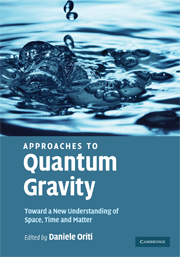Book contents
- Frontmatter
- Contents
- List of contributors
- Preface
- Part I Fundamental ideas and general formalisms
- Part II String/M-theory
- Part III Loop quantum gravity and spin foam models
- 13 Loop quantum gravity
- 14 Covariant loop quantum gravity?
- 15 The spin foam representation of loop quantum gravity
- 16 Three-dimensional spin foam Quantum Gravity
- 17 The group field theory approach to Quantum Gravity
- Questions and answers
- Part IV Discrete Quantum Gravity
- Part V Effective models and Quantum Gravity phenomenology
- Index
13 - Loop quantum gravity
from Part III - Loop quantum gravity and spin foam models
Published online by Cambridge University Press: 26 October 2009
- Frontmatter
- Contents
- List of contributors
- Preface
- Part I Fundamental ideas and general formalisms
- Part II String/M-theory
- Part III Loop quantum gravity and spin foam models
- 13 Loop quantum gravity
- 14 Covariant loop quantum gravity?
- 15 The spin foam representation of loop quantum gravity
- 16 Three-dimensional spin foam Quantum Gravity
- 17 The group field theory approach to Quantum Gravity
- Questions and answers
- Part IV Discrete Quantum Gravity
- Part V Effective models and Quantum Gravity phenomenology
- Index
Summary
Introduction
The modern version of canonical Quantum Gravity is called loop quantum gravity (LQG), see for textbooks and for recent reviews. At present, there is no other canonical approach to Quantum Gravity which is equally well developed. LQG is a Quantum Field Theory of geometry and matter which is background independent and takes fully into account the backreaction of (quantum) matter on (quantum) geometry. Background independence means that there is no preferred spacetime metric available, rather the metric is a dynamical entity which evolves in tandem with matter, classically according to the Einstein equations. These precisely encode the backreaction. This is therefore an entirely new type of QFT which is radically different from ordinary QFT. One could even say that the reason for the fact that today there is not yet an established theory of Quantum Gravity is rooted in the background dependence of ordinary QFT. Therefore ordinary QFT (quantum mechanics) violates the background independence of classical GR while classical GR violates the quantum principle of QFT. This is the point where the two fundamental principles of modern physics collide. LQG tries to overcome this obstacle by constructing a background independent QFT.
In order to see in more detail where the background metric finds its way into the very definition of an ordinary QFT, recall the fundamental locality axiom of the algebraic approach.
- Type
- Chapter
- Information
- Approaches to Quantum GravityToward a New Understanding of Space, Time and Matter, pp. 235 - 252Publisher: Cambridge University PressPrint publication year: 2009
- 1
- Cited by

